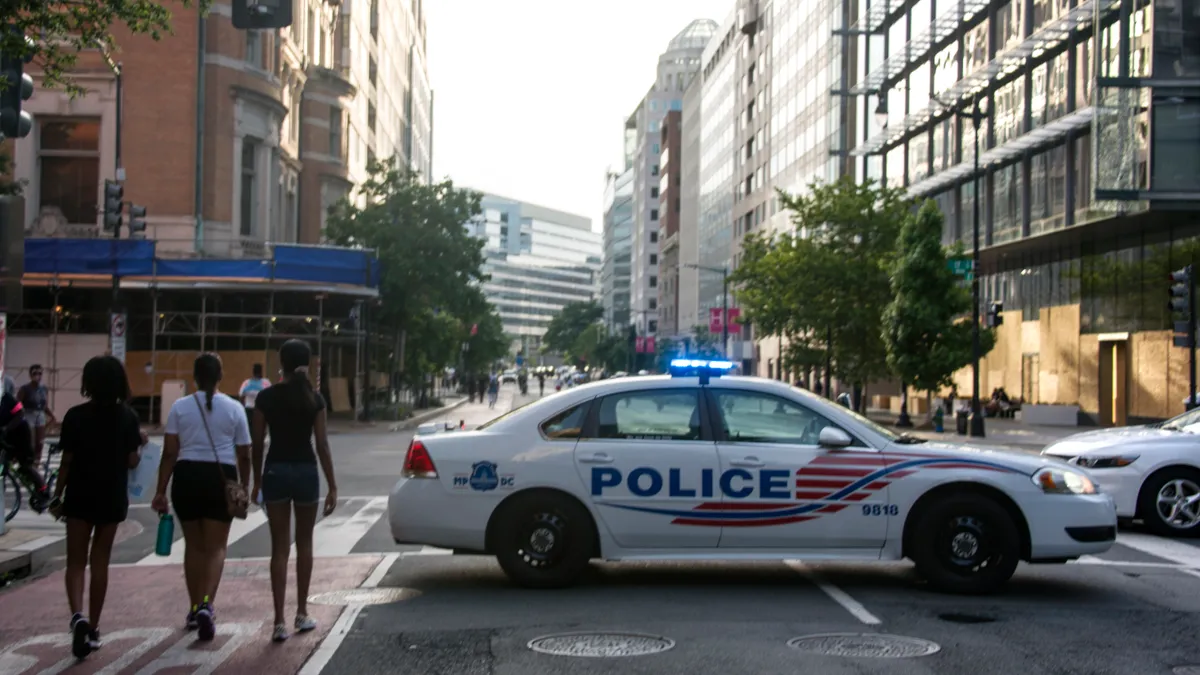In the wake of the killing of George Floyd, an unarmed black man, by Minneapolis police officer Derek Chauvin, school boards and superintendents nationwide are re-examining their policies around police in schools. The moves also follow years of discussions around the school-to-prison pipeline and complaints of discriminatory discipline policies, as well as weeks of civil rights protests prompted by Floyd's death.
Following Minneapolis Public Schools' decision last week to end its relationship with the city's police department, other districts have announced they are discussing their contracts with agencies that provide school resource officers.
The St. Paul Public Schools Board of Education in Minnesota, for example, will make a decision during a meeting on June 23, prior to the June 30 expiration of its contract with the police department.
Jeanelle Foster, the board's vice chair, told the Star Tribune that her board is taking into consideration concerns about the role of police in the city following protests.
In Charlottesville, Virginia — which has periodically experienced civil unrest for many years — protestors called for Charlottesville City Schools to end its SRO contract with the Charlottesville Police Department. And in a June 1 virtual city council meeting discussing the city’s budget, community members pushed officials to reconsider the $300,000 allocated for SROs.
“I think that there are some severe questions at least, if not this fiscal cycle then the next fiscal cycle, about defunding that program and finding a more deeper way of connecting with the community with that kind of funding,” an attendee said, adding her request was “in light of the tremendous emotional trauma that we are dealing with as a nation.” Another said the money could be used to protect programs and staff cut back in light of the recession.
In New York City, Mayor Bill de Blasio announced Sunday his decision to shift funding from the New York Police Department to social workers and youth services, the details of which he said would be ironed out in the next three weeks based on budget negotiations.
Barbara Flores, a Latina activist and school board member in California's San Bernardino City Unified School District since 2008, said her board has rekindled conversations about SROs after recent events. Flores is looking into the district's police and arrest protocols.
“The carotid restraint protocols that we saw the officer used to murder George Floyd are no longer permissible,” she said, adding she asked the city's police chief to ensure they were not included in district procedure.
Other side of school policing debate
In Chicago Public Schools, where students rallied to end the district's $33 million contract with the city's police department, Mayor Lori Lightfoot said she stands by SRO programs.
"Yeah, we're not going to do that. Unfortunately, we need security in our schools," Lightfoot said in a press conference Friday, adding that she understands concerns. "We're carefully calibrating. We're always going to be looking for ways we can do better, but we've got a system in place now that works well and shows a limited ability of CPD to be in school."
She said investing in other programs, like social workers and mental health services, while keeping police funding in place isn't an "either/or" situation.
That's similar to the take of National Association of School Resource Officers Executive Director Mo Canady, a former SRO from Alabama, who said well-trained SROs "bridge the gap between law enforcement and youth with positive relationships."
"I think it’s a horrible decision," Canady said of districts choosing to end contracts with their police departments. "By doing so, they’re dismissing potentially the best form of community-based policing they could hope to have."
With the exception of Portland Public Schools, whose superintendent announced his decision to remove SROs from high schools last week, Canady added districts like Minneapolis which have had issues haven't reached out to his organization for training, which includes anti-bias and adolescent brain development segments.
"I really hope that districts who are making this move are not doing so in a knee-jerk way just from maybe political pressure, or whatever it may be, but that they would be willing to have a conversation about fixing the problem," said Canady, who served as an SRO in Birmingham for the latter half of his career, ending in 2011. "I’ve seen it work. I found very quickly that students of all races, ethnicities and cultures engaged pretty quickly and, I would say, in a positive way."
More than just SROs' roles
Some say while changing SRO policies and roles is a first step, the issue also stems from who is in the classroom and in leadership positions.
Verjeana Jacobs, chief equity and member services officer for the National School Boards Association, recounted a story of a new superintendent who approached the district’s local police department seeking to reform arrests taking place in schools, only to discover many of the referrals were coming from within the school district itself.
“This gets to more than just what the role of SROs or police officers should be,” she said. “It really gets to what’s happening across the country — it's racism. How do we have adults showing up at work?”
Bias or racist attitudes from educators, many believe, contribute to issues like SRO arrests of black or brown students and the school-to-prison pipeline.
Whitney Weathers, an assistant principal at Manual High School in Denver, said she would like to see educators held accountable for their actions toward students and other educators of color. Members of her district’s school board proposed a resolution Friday to end a contract with the Denver Police Department, with a vote coming Thursday. The measure appears to have the votes needed to pass.
“The change [won’t] happen when teachers continually put their students out and micro-agress black children for hoods, or micro-agress black children for not looking you in your face, and a building leader doesn’t stop that teacher right there and tell them [they] are dead wrong,” Weathers said. “I don’t need lip service. I need to know that George Floyd is a symbol of not just the breathlessness that we feel, but the apathy of the people that stood around and watched it happen.”






















